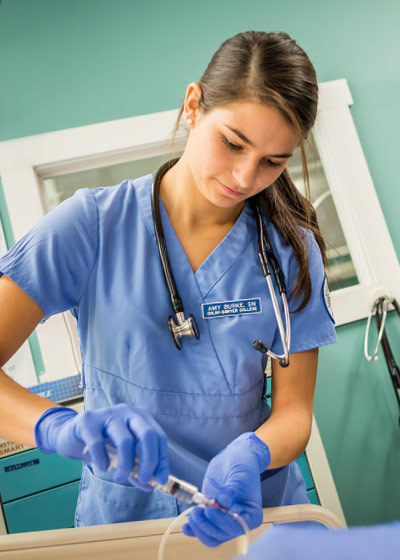School of Nursing & Health Sciences
The nursing, public health, exercise science and athletic training programs are housed in the School of Nursing & Health Sciences. Site facilities that support these programs include two nursing simulation labs, a human performance lab, athletic training lab and exercise training room that supports our collegiate athletic programs and provides hands-on training for students.
Nursing Programs
Colby-Sawyer College has been preparing nurses at the Bachelor of Science level since 1981. Today, it offers three degrees in nursing — a Bachelor of Science (BS) with a major in nursing, a Master of Science in Nursing (MSN) with tracks in nursing education, nursing management and executive leadership and clinical nurse leadership and a Bachelor of Science completion program (RN to BS). For the past 11 years, the NCLEX-RN first-time pass rate has been well above the state and national averages. A critical component of the college’s success is its partnership with Dartmouth Health.
A Colby-Sawyer BS degree in nursing combines clinical experience at Dartmouth Hitchcock Medical Center in Lebanon, a Level 1 trauma center, and New London Hospital with hands-on learning in campus classrooms and laboratories, as well as individual and group research. These students benefit from the best of both worlds — clinical experience at the only tertiary-care academic medical center in New Hampshire and high quality academic and cocurricular opportunities in a vibrant, residential college community.
Athletic Training
The athletic training program is accredited through the Commission on Accreditation of Athletic Training Education and provides preparation in the prevention, diagnosis and intervention of emergency, acute and chronic medical conditions involving impairment, functional limitations and disabilities. This preparation may lead to careers in secondary schools, colleges and universities, professional sports, sports medicine clinics, corporate or industrial settings.
Athletic training students participate in a wide variety of clinical experiences, which can include local and regional hospitals, private and public high schools and Division I, II and III college/university sites. Students are consistently engaged with hands-on learning in courses as well as in their clinical experience placements. All athletic training students complete research as a part of their capstone experience.
The first-time pass rate for athletic training graduates taking the Board of Certification exam exceeds the national average and is currently 89% with a 100% average for the 2018 and 2019 cohorts.
Exercise Science
The exercise science major focuses on the study of human movement as it relates to enhanced motor performance, activities of daily living and improved health and wellness. Students benefit from the interdisciplinary approach to the study of movement including physiological, nutritional, mechanical, developmental and psychological factors. This course of study integrates classroom, laboratory, internship and research experiences that provide students with the necessary disciplinary knowledge and practical skills to develop programs that enhance healthy lifestyles and improve motor performance.
Graduates have a wide range of career opportunities to explore, such as strength and conditioning, personal training, corporate fitness and cardiac rehabilitation. In addition, graduates have opportunities to pursue physical therapy, occupational therapy and physician assistant programs as well as medical school. They also have sought graduate programs in exercise physiology, strength and conditioning, public health and sport psychology.
Public Health
The Bachelor of Science with a major in public health is designed to promote an understanding of health and disease based on public health principles. The primary goal of the program is to train public health professionals who will seek to improve the health status of individuals, communities and populations. The public health program builds upon a broad foundation in the liberal arts and sciences as well as social, ecological and population-based perspectives.
Graduates will be prepared for entry-level public health jobs found in government agencies, health corporations, community non-profit organizations and healthcare facilities. Those wishing to pursue professional careers within the public health arena will be well positioned to continue their studies through matriculation into master’s degree programs in public health.
